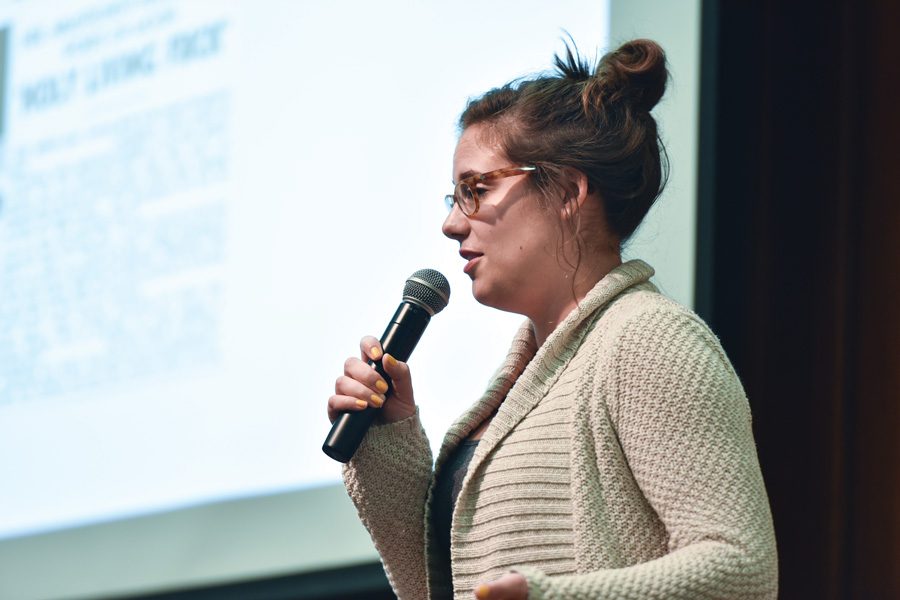The Onion staffers discuss publication, give tips about writing satire
Jeffrey Wang/Daily Senior Staffer
Jen Jackson, a writer for The Onion, speaks during an event hosted by The Northwestern Flipside. Jackson and her colleague Louisa Kellogg discussed The Onion’s process of writing satirical articles.
April 14, 2017
Two writers from The Onion discussed the process behind producing satirical content and the importance of distinguishing between satire and fake news during an event Thursday.
Writers Louisa Kellogg and Jennifer Jackson spoke to about 50 people in Harris Hall, addressing topics ranging from their careers to emails they receive regarding their articles. The event was hosted by The Northwestern Flipside, a satire publication, and was organized by the group’s outgoing president, Jordan Villanueva.
“The Flipside and The Onion have had a pretty good working relationship for a while now,” the Weinberg senior told The Daily. “The editor in chief of The Onion has come up before to workshop headlines with us and work with our staff internally.”
Villanueva said he wanted to bring The Onion staffers to NU because he noticed the student body’s interest in the publication through classmates sharing articles on Facebook.
After reaching out to The Onion’s editor in chief, Cole Bolton, Villanueva said Kellogg and Jackson were recommended. Based on Bolton’s description of the writers, they sounded like the perfect speakers, Villanueva said.
Kellogg and Jackson began their presentation with a satirical history of The Onion and gave equally satirical “tips on how to be as successful as The Onion.” Such tips included “being born white and male.”
All jokes aside, Kellogg and Jackson told attendees about how The Onion writes its articles, providing a behind-the-scenes look into how the publication functions.
“Everything at The Onion starts with a headline,” Kellogg said. “A quick headline you can read right away and get what the joke is.”
About 1,500 headlines are pitched per week with each of the 13 full-time writers coming up with 50 to 70 headlines, but only 2 percent of the headlines end up as articles, Kellogg said.
The writers went on to explain why some headlines fail. If a headline is not rooted in truth, is too derivative from something else on the internet or is an issue that is approached from the wrong angle, it can strike the wrong chord, they said.
“We try to really think carefully about why we’re making a joke and where we’re coming from,” Kellogg said.
Kellogg and Jackson also addressed the differences between fake news and satire during the event. Fake news tells “plausible lies to reinforce biases people already have,” while satire aims to challenge readers’ views by addressing an uncomfortable truth, Jackson said.
The current political climate and the ever-pressing issue of fake news make the distinction between the two crucial to understand, they said.
“Now more than ever, we really need to spend time making sure that our articles couldn’t come off as real as you’re scrolling through your Facebook feed,” Kellogg said.
Kellogg and Jackson also answered audience members’ questions during the event. Weinberg junior Sophie Brauer said she thought the event was “awesome.”
“It’s cool how they were talking about the way satire is meant to inform people in kind of a different way,” Brauer said. “I liked the way that they look at things … you try and articulate things that people haven’t really articulated before.”
Email: [email protected]
Twitter: @AmeliaLangas












